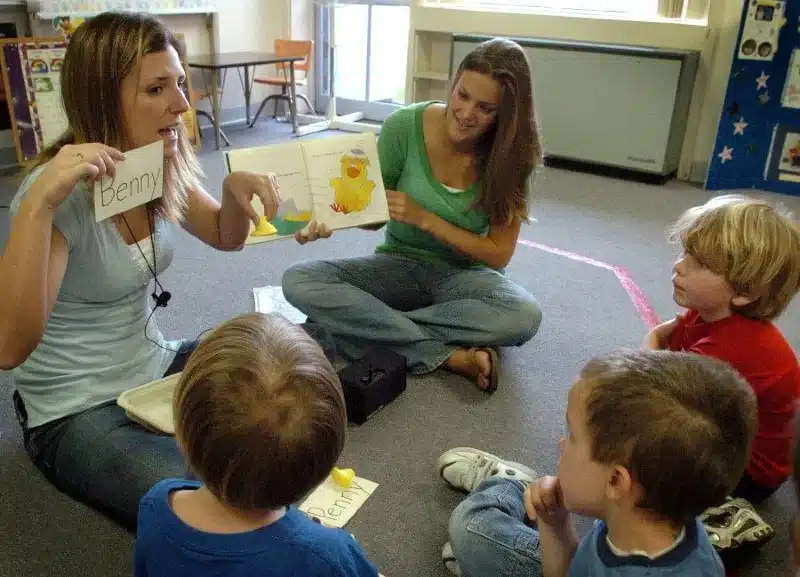Last updated on January 24th, 2024 at 07:24 pm
This fall, my twins will take honors biology. Together. They’ll also take honors geometry. Together. If we had our preference, they’d be in separate classes but since their school is small, it only offers one honors class per subject so we’re stuck. But they won’t be the only multiples in those classes–another pair of twins will be there as well a set of triplets, too!
1. Just Because Twins Are Together in the Classroom Doesn’t Mean They Always Want to Be Together
Many twins take comfort in just knowing that their cotwin is around so it’s not necessary to always pair them together on joint or group projects. In fact, many twins prefer to work with someone other than their cotwin. Working independently of a cotwin not only helps each to learn and develop at his or her own pace but it will also help you differentiate between the two.
2. Bend the Rules When It Comes to Seating Assignments
Often students are assigned to their desks alphabetically but not all twins want to sit one behind the other nor should they. Placing twins on different sides of the classroom gives them the chance to make new friends and also lessens the opportunity or temptation for one to help the other on assignments.
3. Since Identical Twins Have the Exact Same DNA
Similar dispositions and interests, their book reports, essays, and even artwork may appear strangely alike. In fact, their test scores may be within points of each other, too, as their IQ scores often are. This information may be useful if you suspect cheating but always check into it nonetheless by speaking with each twin separately and privately.
4. Many Multiples Have Different Learning Styles
Especially if they’re fraternal twins. One twin may be a visual learner while the other is more of an auditory learner. Furthermore, don’t assume that if one twin is great in math that the other will be as well. Like all siblings, twins will have their separate strengths as well as challenges.
5. Having Any Two Siblings in the Same Class Makes It More Confusing to Learn Their Correct Names
But twins really appreciate it when you go the extra mile to get it right. If you’re having trouble distinguishing one from the other, ask them privately for hints or clues that will help you to differentiate between them. (For more tips on connecting the name with the face, see this blog post.)

6. Don’t Speak to the Twins in Your Classroom Collectively
Such as “When I call your name, you may get your backpacks: John, Suzie, Scott, and the Smiths.” Instead, refer to each child by name. (If you’re having trouble distinguishing one from the other, see #5)
7. Don’t Be Afraid to Give One Twin a Beloved Classroom Job
Like “door monitor” but not the other, and conversely, don’t withhold an award from one twin such as “Star Student” for fear that it will hurt the feelings of her cotwin. Either way, it’s twin discrimination. Like all children, twins need to develop that ability to withstand the normal ups and downs of life but will never learn this important lesson if someone always tries to level their playing field.
8. Don’t Openly Compare Your Twin Students in Class
And gently change the topic when other students do it as well. It’s the number one complaint of twins who share a classroom. Fun questions such as “Who was born first?” can quickly turn to “Who’s smarter?” or “Who got the better score on the science test?” It takes a teacher’s keen sense of awareness to know when the questions have taken an ugly turn so it’s best to keep them to a bare minimum.
9. When It Comes Time for a Parent-Teacher Conference, Always Compare the Work of Each Twin to the Class as a Whole
Rather than to one another. And better yet, make sure you have matched the correct twin with his student file before you begin your meeting. (It may seem like a no-brainer but you’d be surprised how often mistakes happen.)
10. If You Believe the Shared Classroom Arrangement Isn’t Working and Separation Would Be More Beneficial
Arrange a meeting with the parents to express your concerns. School life is clearly different from home life and while twins may get along at home, they may resent being together in school. Let the parents know.
Enjoy these final days of summer. I know I’ll be heading to the beach to cool off and prepare myself mentally for the chaos of the upcoming school-year.
These tips written by Christina Baglivi Tinglof
Thank you VERY much Christina for letting us use this article at Twiniversity.
Related Articles
- Should I Separate My Twins in School? What the Research Suggests
- Should Twins Share a Classroom?
- Preparing Twins for the First Day of School










